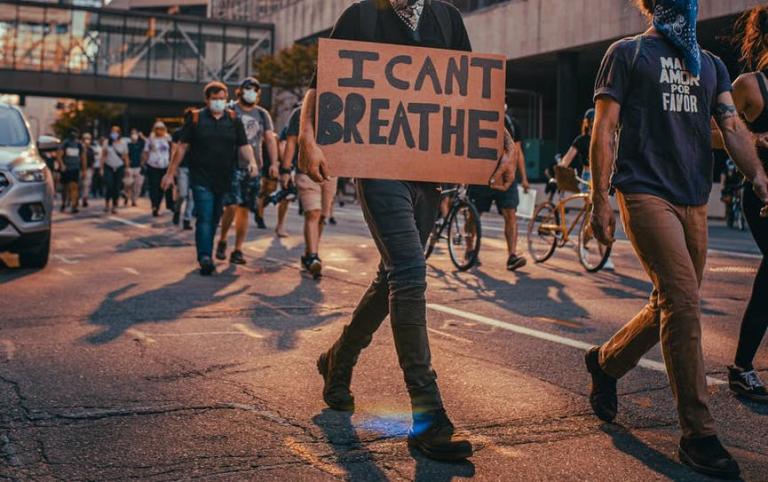On the website wikiHow.com, there’s a short exercise you can take to tell if you are a racist. It’s only five steps so I figured why not?
Step 01: Consider your judgments of what people wear, their hairstyles, headscarves, etc. Are these thoughts negative or justified?
Given the fact that I’m middle aged and balding I’m fairly conscious slash jealous of anyone with a full head of hair, I’m not sure I fare well on this question. I think that you can tell a bit about a person by the way they dress, at least what subculture they are attempting to identify with. It’s pretty easy to pick out the hipster—skinny jeans, tight fitting shirt, dark rimmed glasses, maybe a bow-tie or some leather boots. Or the soddy—Stetson, ropers, crease in down the front of their jeans.
Step 02: Gauge your fear of being around people who are not of the same race as you.
I mostly have a fear of saying or doing something that makes me sound like or appear to be stupid. Race is only one in a long list of things that can trip that particular neurosis.
Step 03: Note the frequency of your racial slurs and jokes.
Step 04: Think about your upbringing. Are your parents racist or extremely prejudiced? Many racists learned their behavior in childhood from the influence of relatives.
These two are tricky.
I confess that I told racist jokes when I was young, or even not that young. I wish I hadn’t, but the truth is that I did. It was acceptable. The small town Kansas’s world in which I grew up wasn’t exactly cosmopolitan. Everyone was very aware of race, but among my good-hearted relatives, especially those from the South I can’t remember a single strident racist. Though rarely explicit, and never programmatic, racialized thinking was still customary.
Racism mostly came out through racial jokes. African Americans, Vietnamese, Polish, Jews, Red-necks, and the Irish were all targets of some kind of humor. I don’t think I realized until I was much older than most of my people were farmers and oil-field workers. I come from a long line of rednecks and roughnecks, which is possibly why those jokes got the most laughter.
To be sure, humor was a subtle way of reinforcing racial stereotypes and class distinction. The jokes were told as if to say, “We might be poor rednecks, but we’re better than those…” fill in the blank with whatever socially unacceptable racial circumlocution was common to the person’s vernacular and particular prejudice. All of it was wrong. All of it seemed harmless at the time. It doesn’t anymore.
Racism was a normal part of my world. Nobody openly challenged those underlying beliefs until high school. I say beliefs but that might not be right. Racism wasn’t so much a belief as it was a habit of the mind. In fact, when it was couched as a belief and held before me to consider I immediately rejected the premise and slowly began to change the behavior and thought patterns.
The truth is, however, that once those neural pathways are formed, it’s easy to go there, even if it’s only in your mind. Firing is wiring, and my brain was wired from a young age by generations of folks who saw race very differently. It’s important to tell the truth about the ghostly echoes of racist thought, the leftover relics of an early stage of development that still exist in my mind.
Step 05: Consider the following questions:
- Do you think of all people of any particular race act in the same way?
- Do you always refer to people’s race in your description of them or do you deliberately leave out the obvious so as not to offend?
- Do you ascribe certain negative behaviors to people of certain races and insist that only they do this?
- Do you think all people of a particular race look alike
- Do you dislike other races, or do you just love your own?
What are you asking me? Do I think white men can’t jump, or don’t have rhythm? Do I think women make less than men and this isn’t fair? Do I think poverty, crime, drugs, and violence in my hometown of Kansas City are, to a high degree, concentrated among Spanish speaking immigrants and African Americans, while rich white suburbanite seem univocally vine with this arrangement? Do I think Yankees fans are obnoxious? Do I think all Muslims are terrorists? Do I wish the Jehovah’s Witnesses would stop ringing my doorbell?
I’m not a fan of step five. Race, gender, ethnicity, religion, these qualifiers complicate our lives because they expose the selfishness that lives at the heart of all people. But there’s always the possibility that, when it comes to race I am hopelessly stunted. Am I a racist? No, I don’t think so. But I’m a white, middle-class, educated, heterosexual, American, male. Can you think of any segment of society less qualified to determine whether or or not somebody is racist? I know that at some point I was. And in some unredeemed part of my consciousness, at some level, I have to say I am. Or at least I was, and it still plagues my memory. All this to say that in my experience, it is not effortless to think about race. And, I’m aware that, unlike my life, race is constantly on the mind of those for whom it poses significant challenges.
However, I’m also a Christian. I have been taught to put myself last in the pecking order, to consider everyone else as above me in some way. Humility is a kingdom virtue. I’m taught to move toward “the other” in love, no matter what the attribute may be that makes them “the other” in the first place. Christianity isn’t a belief system, it’s a way of being human, a way Jesus taught and continues to empower.
You want to lead the way? One leads through humility in this kingdom. You want to strive to be first? Then you will be last in the kingdom of God. You try to grasp for the life you want, it will slip through your fingers and you’ll lose it. You want to control others by oppressing them for whatever reason, you will find yourself on the business end of a universe that was designed to resist this. The Christian must be willing lay down their life for others, consider them better, higher, above. One must spend their life and time & energy serving those to whom we have been given.
















